Albania is not yet a big holiday destination, but I’m just back from a week there, travelling with my family, and with this list of books hope to share my experiences. October is still beautiful weather in Albania, and we swam in the sea, wandered around Roman ruins and clambered up rocky screes without seeing hardly any other tourists. The supermarkets in Albania have only sparse packaged provisions, there’s not much on the shelves, but there is no shortage of vegetables and fruit, feta cheese and fresh bread. Albania’s countryside is stunning, the drop from mountains to the sea one of the most beautiful backdrops to a beach I have every seen, but the remnants of Communism are everywhere, with ugly apartment blocks and rubbish tipped over the side of gorges. Like Beijing in China, the beauty in Albania is there but slightly hidden, a combination that can be very powerful.
1
This guide to Albania from Bradt travel guides is the only one we could find that was wholly dedicated to Albania. The author, Gillian Gloyer, has done a great job. She lived in Albania four years until 2002 and clearly fell in love with it. As she writes in the introduction, "For most visitors, the greatest revelation about Albania is the hospitality and kindness of the Albanian people. They won my heart long ago; having to update this book is nothing more than an excuse of me to go back to the country again and again." Her familiarity with Albania really shows in her excellent coverage of all the main places, the archaeological sites, a bit of the history, and anything else you might want to do or know about while travelling to Albania. She also gives good advice on where to stay and what to eat. In a week’s trip, we managed only to see the southern half of the country, and did not explore the mountains in the north. The highlights were the Roman ruins at Butrint, a UNESCO World Heritage site, and the mountain town of Gjirokastra. In Gjiorkastra we stayed at the Kalemi 2 Hotel, which we found via the Bradt guide and was absolutely stunning. While we were in Gjirokastra, we also tried to hike to a village in the next valley, but the scree was tough going and there were no hiking trails, only the paths used by shepherds and their sheep. In the end we decided we weren’t going to make it before dusk, which comes early in Albania, and we turned back. While we were hiking we did meet a shepherd and were treated to lunch (feta and tomatoes on fresh bread) and raki and instant Turkish coffee at this hut. The Albanians have a strong tradition of hospitality (on which more below).
2
When visiting any country, it’s interesting to read the work of its greatest writers. Albania’s best-known novelist is Ismail Kadare, who won the Booker International Prize for his work, when the prize was inaugurated in 2005. Of his many books, my husband picked Broken April to read on our holiday, as it’s about the Albanian tradition of the blood feud. This is such a grisly tradition, that it’s hard not to read the entire book. By reading the novel, you learn about the ‘Kanun’ of the northern highlands of Albania, the ancient code that regulates the blood feud. Although he doesn’t want to, the main protagonist, Gjorg, is obligated to take revenge for his brother, who has been killed by a member of another family. In turn, Gjorg will also be doomed. So far, 22 men from each family have been killed in this way. In many ways, Ismail Kadare makes the whole thing ridiculous. He describes, for example, the original incident that has led to the loss of so many lives. It was not some heinous crime committed by one family against the other. Rather, it’s a half-forgotten incident a few generations ago, involving a stranger and the rules of hospitality (hospitality is taken very seriously by the Kanun). But while making it ridiculous, Ismail Kadare also makes it clear how if an entire society subscribes to certain norms, it’s almost impossible for the individual to escape its logic. Other books by Ismail Kadare that were recommended to us—when we visited his house in Gjirokastra—were Chronicle In Stone and General Of The Dead Army.
3
I don’t generally read travel writing about a country when I visit it, as I feel I’m the traveller and I want to make up my own mind about a place and make my own observations about it. But in the case of Albania, there have been so many political changes and different phases that even a book published in 1998 and based on a journey there in the summer of 1996 is really a history book, a snapshot of a society that’s very different from the one I’m visiting. Journalist Robert Carver is the author of Accursed Mountains: Journeys in Albania. As I understand it, after the fall of Communism in the early 1990s, Albania became a democracy, then gradually descended into anarchy after the failure of a number of Ponzi schemes led to widespread bankruptcies. It was during this period that many Albanians escaped overseas, as there was widespread civil unrest. Albanian friends say it wasn’t safe to walk around with random shootings and people getting killed just going about their business. The Accursed Mountains is set in the period just before that. A Dutch cyclist touring Albania tells Carver, ‘This country is getting ready to explode —and soon.” Carver’s book is filled with menace, with men chasing him with knives at one tourist spot, and locals constantly warning him that going somewhere is dangerous. The police are simply interested in taking money off everyone, and everyone else is constantly trying to rip off Carver, because he’s a foreigner. All that has changed. Going around Albania is now a placid, touristic experience, and even our experience with the police (who stopped us for overtaking when we shouldn’t have been) positive. Carver is very interested in the political history of Albania, the transition from Communism to democracy and talking to everyone about it. He does a lot of analysis of the characters he befriends, but his conclusions about them are generally not that favourable.
4
On a trip to any country, it’s essential to bring a map. In Albania it’s particularly essential, as it’s not in the EU, so data roaming charges from using Google or Apple maps while navigating around can build up quickly. This map helped us get all around the country. Though it doesn’t have streets maps for the towns, hotels are quite well signposted once you arrive, so you don’t even really need your phone for finding those. Only in the case of Tirana, the sprawling and traffic-clogged capital, was a phone absolutely essential for finding our hotel. This map of Albania shows all the roads around the country, and one thing my husband commented on a number of times is what good shape they’re in. We did not explore the north of Albania, but certainly everywhere we visited in the south was blessed with pristine tarmac roads. Still, I’m pleased to say there were still signs that you weren’t just in Britain or Holland. While driving down one motorway (highway), there were practically no other cars, but two bicyclists had decided it was fine to travel down it in their lycra gear. We also particularly liked the way old Albanian men seemed to enjoy taking their cows for a walk and to eat grass on the verges of the road, or in the island in between the lanes. One last point about the map: Albania is quite a small country, so you can get around it quite quickly. We had just a week’s holiday. If we’d taken 10 days and done a bit more planning, we probably could have made it to the north and included the ‘Albanian Alps’ on our trip, which are supposed to be absolutely beautiful and wild.
5
My final book is an Albanian phrasebook, which we didn’t take with us, but I absolutely regretted because it would have been so nice to be able to talk to people more. My husband quickly asked how to say thank you in Albanian (‘faleminderit’) and saying this went down so well it would have been wonderful to try out a few more words. Quite a few people around Albania do speak English, so it was relatively easy to get by without the language, but at one crucial point we did have to phone an Albanian friend back in the UK to translate for us. We were heading up a small, unmarked track in the mountains and a shepherd was pointing to his head repeatedly and shouting at us while gesticulating wildly. We deduced he was saying we were mad to go that way, and even my husband, who tends to ignore such warnings, was concerned enough to turn back to try and talk to him about what dangers lay ahead. After getting the shepherd to explain his distress to our friend back in the UK, it turned out he was not saying we were mad, just that he had a terrible headache, and did we have any painkillers? I’m not sure this misunderstanding could have been avoided just with a phrasebook, but it might have prevented us feeling quite so helpless.
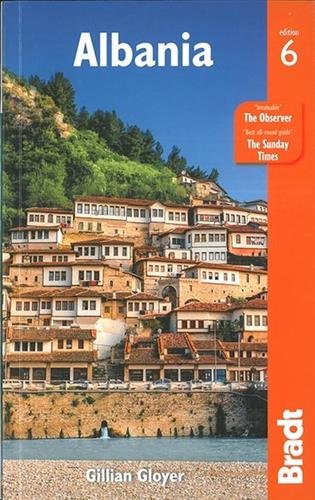
1
This guide to Albania from Bradt travel guides is the only one we could find that was wholly dedicated to Albania. The author, Gillian Gloyer, has done a great job. She lived in Albania four years until 2002 and clearly fell in love with it. As she writes in the introduction, "For most visitors, the greatest revelation about Albania is the hospitality and kindness of the Albanian people. They won my heart long ago; having to update this book is nothing more than an excuse of me to go back to the country again and again." Her familiarity with Albania really shows in her excellent coverage of all the main places, the archaeological sites, a bit of the history, and anything else you might want to do or know about while travelling to Albania. She also gives good advice on where to stay and what to eat. In a week’s trip, we managed only to see the southern half of the country, and did not explore the mountains in the north. The highlights were the Roman ruins at Butrint, a UNESCO World Heritage site, and the mountain town of Gjirokastra. In Gjiorkastra we stayed at the Kalemi 2 Hotel, which we found via the Bradt guide and was absolutely stunning. While we were in Gjirokastra, we also tried to hike to a village in the next valley, but the scree was tough going and there were no hiking trails, only the paths used by shepherds and their sheep. In the end we decided we weren’t going to make it before dusk, which comes early in Albania, and we turned back. While we were hiking we did meet a shepherd and were treated to lunch (feta and tomatoes on fresh bread) and raki and instant Turkish coffee at this hut. The Albanians have a strong tradition of hospitality (on which more below).
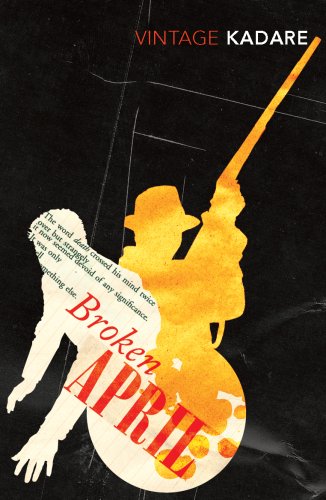
2
When visiting any country, it’s interesting to read the work of its greatest writers. Albania’s best-known novelist is Ismail Kadare, who won the Booker International Prize for his work, when the prize was inaugurated in 2005. Of his many books, my husband picked Broken April to read on our holiday, as it’s about the Albanian tradition of the blood feud. This is such a grisly tradition, that it’s hard not to read the entire book. By reading the novel, you learn about the ‘Kanun’ of the northern highlands of Albania, the ancient code that regulates the blood feud. Although he doesn’t want to, the main protagonist, Gjorg, is obligated to take revenge for his brother, who has been killed by a member of another family. In turn, Gjorg will also be doomed. So far, 22 men from each family have been killed in this way. In many ways, Ismail Kadare makes the whole thing ridiculous. He describes, for example, the original incident that has led to the loss of so many lives. It was not some heinous crime committed by one family against the other. Rather, it’s a half-forgotten incident a few generations ago, involving a stranger and the rules of hospitality (hospitality is taken very seriously by the Kanun). But while making it ridiculous, Ismail Kadare also makes it clear how if an entire society subscribes to certain norms, it’s almost impossible for the individual to escape its logic. Other books by Ismail Kadare that were recommended to us—when we visited his house in Gjirokastra—were Chronicle In Stone and General Of The Dead Army.
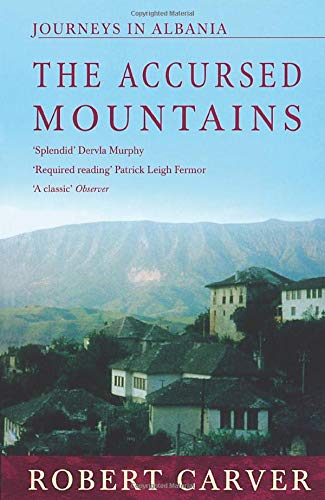
3
I don’t generally read travel writing about a country when I visit it, as I feel I’m the traveller and I want to make up my own mind about a place and make my own observations about it. But in the case of Albania, there have been so many political changes and different phases that even a book published in 1998 and based on a journey there in the summer of 1996 is really a history book, a snapshot of a society that’s very different from the one I’m visiting. Journalist Robert Carver is the author of Accursed Mountains: Journeys in Albania. As I understand it, after the fall of Communism in the early 1990s, Albania became a democracy, then gradually descended into anarchy after the failure of a number of Ponzi schemes led to widespread bankruptcies. It was during this period that many Albanians escaped overseas, as there was widespread civil unrest. Albanian friends say it wasn’t safe to walk around with random shootings and people getting killed just going about their business. The Accursed Mountains is set in the period just before that. A Dutch cyclist touring Albania tells Carver, ‘This country is getting ready to explode —and soon.” Carver’s book is filled with menace, with men chasing him with knives at one tourist spot, and locals constantly warning him that going somewhere is dangerous. The police are simply interested in taking money off everyone, and everyone else is constantly trying to rip off Carver, because he’s a foreigner. All that has changed. Going around Albania is now a placid, touristic experience, and even our experience with the police (who stopped us for overtaking when we shouldn’t have been) positive. Carver is very interested in the political history of Albania, the transition from Communism to democracy and talking to everyone about it. He does a lot of analysis of the characters he befriends, but his conclusions about them are generally not that favourable.
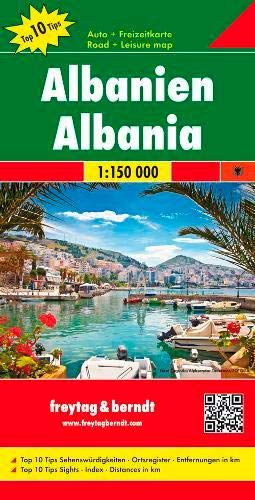
4
On a trip to any country, it’s essential to bring a map. In Albania it’s particularly essential, as it’s not in the EU, so data roaming charges from using Google or Apple maps while navigating around can build up quickly. This map helped us get all around the country. Though it doesn’t have streets maps for the towns, hotels are quite well signposted once you arrive, so you don’t even really need your phone for finding those. Only in the case of Tirana, the sprawling and traffic-clogged capital, was a phone absolutely essential for finding our hotel. This map of Albania shows all the roads around the country, and one thing my husband commented on a number of times is what good shape they’re in. We did not explore the north of Albania, but certainly everywhere we visited in the south was blessed with pristine tarmac roads. Still, I’m pleased to say there were still signs that you weren’t just in Britain or Holland. While driving down one motorway (highway), there were practically no other cars, but two bicyclists had decided it was fine to travel down it in their lycra gear. We also particularly liked the way old Albanian men seemed to enjoy taking their cows for a walk and to eat grass on the verges of the road, or in the island in between the lanes. One last point about the map: Albania is quite a small country, so you can get around it quite quickly. We had just a week’s holiday. If we’d taken 10 days and done a bit more planning, we probably could have made it to the north and included the ‘Albanian Alps’ on our trip, which are supposed to be absolutely beautiful and wild.
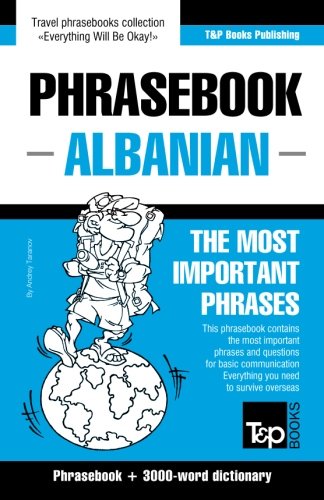
5
My final book is an Albanian phrasebook, which we didn’t take with us, but I absolutely regretted because it would have been so nice to be able to talk to people more. My husband quickly asked how to say thank you in Albanian (‘faleminderit’) and saying this went down so well it would have been wonderful to try out a few more words. Quite a few people around Albania do speak English, so it was relatively easy to get by without the language, but at one crucial point we did have to phone an Albanian friend back in the UK to translate for us. We were heading up a small, unmarked track in the mountains and a shepherd was pointing to his head repeatedly and shouting at us while gesticulating wildly. We deduced he was saying we were mad to go that way, and even my husband, who tends to ignore such warnings, was concerned enough to turn back to try and talk to him about what dangers lay ahead. After getting the shepherd to explain his distress to our friend back in the UK, it turned out he was not saying we were mad, just that he had a terrible headache, and did we have any painkillers? I’m not sure this misunderstanding could have been avoided just with a phrasebook, but it might have prevented us feeling quite so helpless.
© Five Books 2026